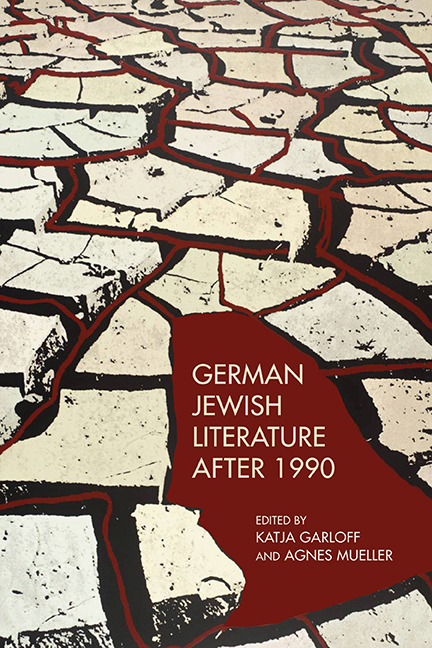Book contents
- Frontmatter
- Contents
- Acknowledgments
- Introduction
- I Self-Reflection in First- and Second-Generation Authors
- II Multiple Identities and Diversification of Holocaust Memory
- 4 The German Jewish Migrant Novel after 1990: Politics of Memory and Multidirectional Writing
- 5 Beyond Negative Symbiosis: The Displacement of Holocaust Trauma and Memory in Alina Bronksy's Scherbenpark and Olga Grjasnowa's Der Russe ist einer, der Birken liebt
- 6 Memory without Borders? Migrant Identity and the Legacy of the Holocaust in Olga Grjasnowa's Der Russe ist einer, der Birken liebt
- 7 Multilingualism and Jewishness in Katja Petrowskaja's Vielleicht Esther
- III New Themes and Directions in Recent German Jewish Literature
- IV Coda: Interviews with Two Contemporary German Jewish Writers
- Bibliography
- Notes on the Contributors
- Index
5 - Beyond Negative Symbiosis: The Displacement of Holocaust Trauma and Memory in Alina Bronksy's Scherbenpark and Olga Grjasnowa's Der Russe ist einer, der Birken liebt
from II - Multiple Identities and Diversification of Holocaust Memory
Published online by Cambridge University Press: 07 September 2018
- Frontmatter
- Contents
- Acknowledgments
- Introduction
- I Self-Reflection in First- and Second-Generation Authors
- II Multiple Identities and Diversification of Holocaust Memory
- 4 The German Jewish Migrant Novel after 1990: Politics of Memory and Multidirectional Writing
- 5 Beyond Negative Symbiosis: The Displacement of Holocaust Trauma and Memory in Alina Bronksy's Scherbenpark and Olga Grjasnowa's Der Russe ist einer, der Birken liebt
- 6 Memory without Borders? Migrant Identity and the Legacy of the Holocaust in Olga Grjasnowa's Der Russe ist einer, der Birken liebt
- 7 Multilingualism and Jewishness in Katja Petrowskaja's Vielleicht Esther
- III New Themes and Directions in Recent German Jewish Literature
- IV Coda: Interviews with Two Contemporary German Jewish Writers
- Bibliography
- Notes on the Contributors
- Index
Summary
IN HIS LEAD ARTICLE in the first issue of the journal Babylon (1986), Dan Diner posited a negative German-Jewish symbiosis that he predicted would last for generations:
Seit Auschwitz—welch traurige List—kann tatsächlich von einer “deutsch-jüdischen Symbiose” gesprochen werden—freilich einer negativen: für beide, für Deutsche wie für Juden, ist das Ergebnis der Massenvernichtung zum Ausgangspunkt ihres Selbstverständnisses geworden; eine Art gegensätzlicher Gemeinsamkeit.
[Since Auschwitz—what a sad twist—we can indeed speak of a “German-Jewish symbiosis”—admittedly a negative one: for both Germans and Jews, the aftermath of mass destruction has become the starting point for their respective self-conception; a kind of communality of opposites.]
A few years later Zafer Şenocak proposed in his essay “Deutschland— Heimat für Türken?” (Germany—Home for Turks?, 1990) that Turkish immigrants must engage “deeply” with Germany's history, especially the history of German Jews (previously Germany's largest religious minority) and the Holocaust: “Heißt in Deutschland einzuwandern nicht auch, in die jüngste deutsche Vergangenheit einzuwandern?” (Doesn't immigrating to Germany also mean immigrating to, entering into the arena of Germany's recent past?) Since the publication of these two essays, however, Germany has gradually achieved a veneer of normalcy and a sense of national identity less encumbered by the Holocaust past. Indeed, as Helmut Schmitz has observed, the topic of German wartime suffering, far from being taboo, is “omnipresent in contemporary Germany.” In addition, the immigration of large numbers of Jewish “quota refugees” from the states of the former Soviet Union has radically altered the demographic makeup of the Jewish community (official and otherwise) in Germany, and a new generation of German Jewish writers from the former Soviet states have likewise reconfigured the German Jewish literary landscape by challenging its focus on the Holocaust as the primary site of collective trauma and memory.
My essay focuses on two novels, by Olga Grjasnowa and Alina Bronsky, that challenge the binary described in Diner's negative symbiosis, and the “pre-eminence” of Holocaust memory in constituting German and Jewish identities, through the portrayal of protagonists whose personal experiences of trauma and its aftereffects lie elsewhere.
- Type
- Chapter
- Information
- German Jewish Literature after 1990 , pp. 102 - 122Publisher: Boydell & BrewerPrint publication year: 2018
- 2
- Cited by



